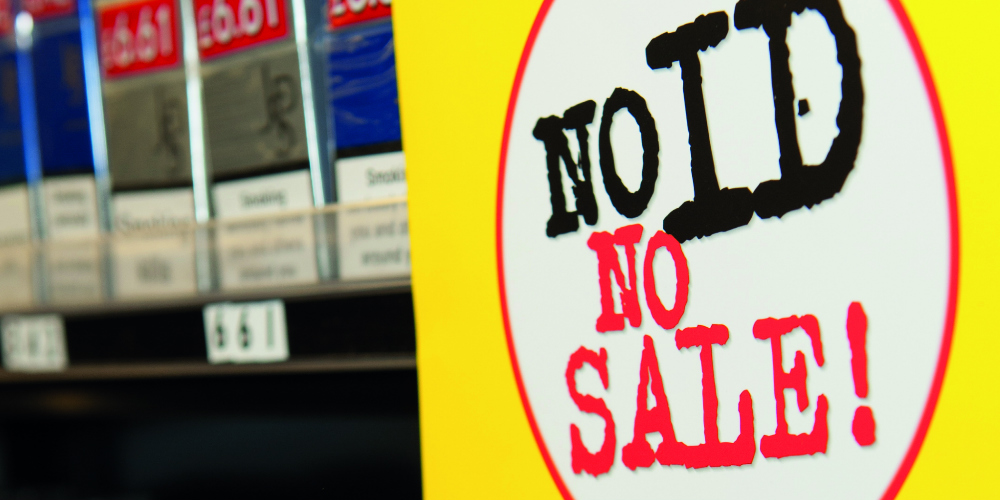Independent retailers are 13% more likely to fail an underage sales test than the average store, new data has found.
According to test purchase service Serve Legal, which carried out 120,000 spot checks on retailers last year, independents are not keeping up with their competitors when it comes to preventing sales to minors, leaving them at risk of massive fines.
 Serve Legal director Ed Heaver told Retail Express: “I can understand why their pass rate may be lower. Independents face a lot of red tape and cost pressures, but they need to look at whether their training and testing is up to scratch.”
Serve Legal director Ed Heaver told Retail Express: “I can understand why their pass rate may be lower. Independents face a lot of red tape and cost pressures, but they need to look at whether their training and testing is up to scratch.”
Supermarkets lead the market with a 90% underage sales pass rate, followed by discounters at 83%, convenience stores (including multiple formats) at 80%, forecourts at 78% and independents at 70%. There were also massive regional differences, with Scottish retailers performing best, while those in Northern Ireland performed worst.
Heaver said an inconsistent approach by authorities to underage sales enforcement is behind the differing pass rates, which also creates confusion for retailers. “It’s not the fault of any individual or authority, but it suggests the need for a centralised approach.”
Overall, pass rates for all retailers improved by one percentage point compared to 2015. Serve Legal found that proof of ID was more likely to be requested for sales of traditional cigarettes than e-cigarettes, and in 7% of tobacco sale visits by mystery shoppers, products were retrieved from the cabinet before ID was requested.
Read Ed Heaver's six tips for ensuring age check compliance in your store below
1. Beware the beard
 “The statistics show that things like hair colour changes and beards seriously affect the pass and fail rate," said Heaver. "This is a challenge for retailers with the current facial hair fashion as there are a lot of 17-year-olds for instance who have facial hair and could catch a retailer out.”
“The statistics show that things like hair colour changes and beards seriously affect the pass and fail rate," said Heaver. "This is a challenge for retailers with the current facial hair fashion as there are a lot of 17-year-olds for instance who have facial hair and could catch a retailer out.”
2. Follow the supermarkets
 Heaver said the best performers for preventing underage sales are supermarkets. "To them, it’s like health and safety, and food hygiene – it’s part of the whole piece on compliance," he added.
Heaver said the best performers for preventing underage sales are supermarkets. "To them, it’s like health and safety, and food hygiene – it’s part of the whole piece on compliance," he added.
"If an employee performs badly in a supermarket shop test there’s the potential to be disciplined, lose bonuses and other measures. I think this is really the reason why supermarkets are outperforming the market with more than 90% in terms of compliance.
"They also celebrate people doing well, which I think is under-utilised in other stores. If a staff member passes a test there should be some recognition”
3. Treat training and test purchasing as insurance
 “Retailers may look at the cost of training and say "no thanks", but they should see it as an insurance policy against the police or trading standards shutting them down," said Heaver.
“Retailers may look at the cost of training and say "no thanks", but they should see it as an insurance policy against the police or trading standards shutting them down," said Heaver.
"When we have clients in trouble over licensing, they’ve been able to produce the data to show they have systems in place and the police and trading standards have backed off because they can see that it’s probably a one-off and it’s being taken seriously.”
4. Customer service is the cure
 Poor customer service is the leading cause. Not looking people in the eye and not engaging with the customer early on will not help prevent underage purchase attempts. "We found that our shoppers can even predict when they won’t get ID’d based on this," he said. "We know that good customer service starts a psychological contract and takes the heat out of the issue.”
Poor customer service is the leading cause. Not looking people in the eye and not engaging with the customer early on will not help prevent underage purchase attempts. "We found that our shoppers can even predict when they won’t get ID’d based on this," he said. "We know that good customer service starts a psychological contract and takes the heat out of the issue.”
5. Beware the slow hours
 “When caught, some say that it was busy in store or they didn’t get a chance to, but our experience shows that staff are more on it when it’s busy. It’s when it is quieter that staff take their eye off the ball and stores are at risk,” said Heaver.
“When caught, some say that it was busy in store or they didn’t get a chance to, but our experience shows that staff are more on it when it’s busy. It’s when it is quieter that staff take their eye off the ball and stores are at risk,” said Heaver.
6. Use printed material
 Heaver said: "When we first started underage sales testing we were looking at forecourts in parts of London, and intimidation was often given for why a staff member didn’t ask for ID.
Heaver said: "When we first started underage sales testing we were looking at forecourts in parts of London, and intimidation was often given for why a staff member didn’t ask for ID.
"I think where people can now point to Think 25 badges and posters, it has taken some of the heat out of it. The better trained staff will tell them, “I’m just doing my job.” There’s no silver bullet, but better training and resources is reducing it."



Comments
This article doesn't have any comments yet, be the first!